11 awkward moments when communicating via email
E-mail is an integral part of our life, it is a fact. Most of us have acquaintances who have deleted their profiles from Facebook or have refused to start them altogether, taking over from their ego. Maybe you even know those who are proud of the refusal of the smartphone on their own. But no one in the adult internet-dependent world is allowed to not have email.
The refusal of email today is comparable to the refusal of a phone number: you must really be on your own wave in order to venture on it.
And here we all write something in the windows of new messages, fight in mailboxes - everything seems to be going well. But, as with any social interaction, electronic correspondence has its pitfalls.
')
Let's discuss the 11 most awkward moments that electronic correspondence brings to our lives.
Translated by localization company Alconost

If someone with whom you correspond:
he has full power over you.
The unequal distribution of power in emails can be explained by many factors: the difference in career position or age, the “customer is always right” circumstance, the correspondence of many people with one addressee. But usually it happens because the one who writes high-quality letters needs something from the one who writes it at random. That's how simple it is.
I do not mean those who like this song. It is more about those whose youth came in the 70s and whose competencies do not include issues from the field of IT.
These are the last of the Mohicans, still using the AOL address. They scan a paper copy of the article and send it as an attachment to the letter instead of sending a link to the article. They write the word "e-mail" with a hyphen. And they don’t even suspect the existence of the option “Answer all”:
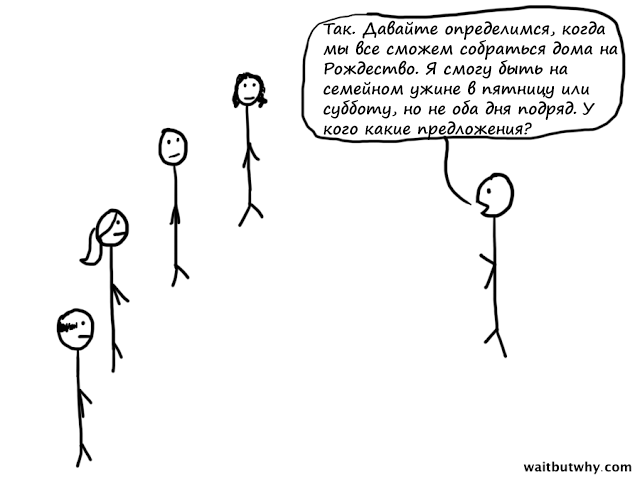
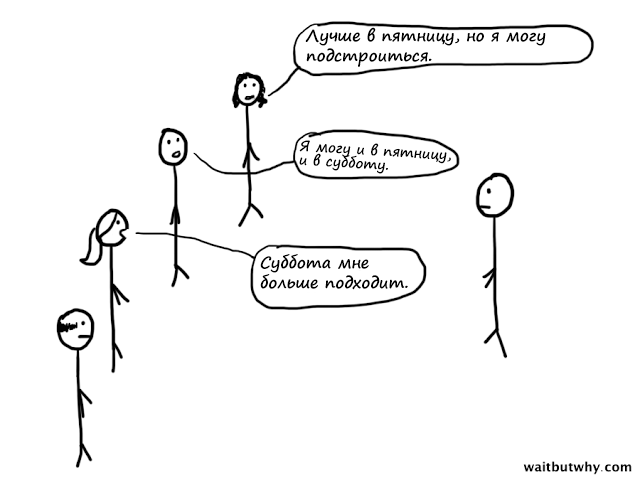
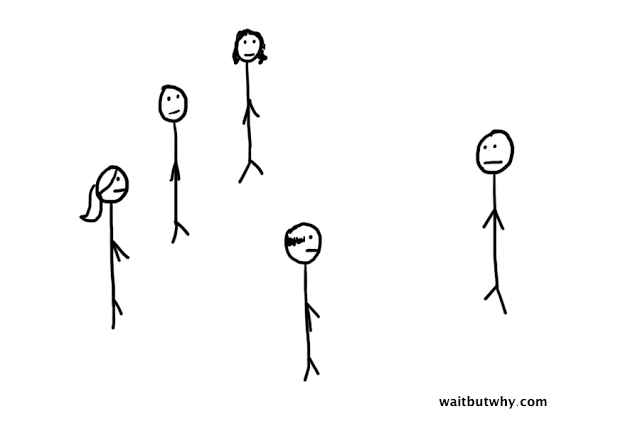
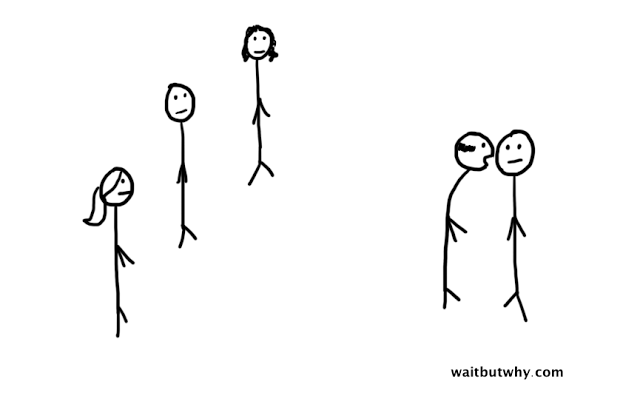
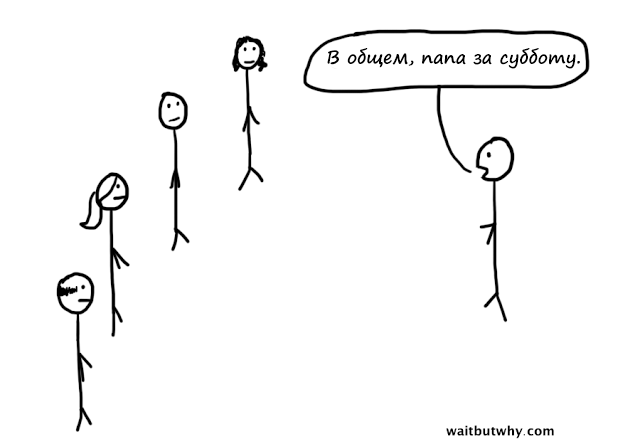
Sometimes you meet people who, for inexplicable reasons, write letters only in capital letters:
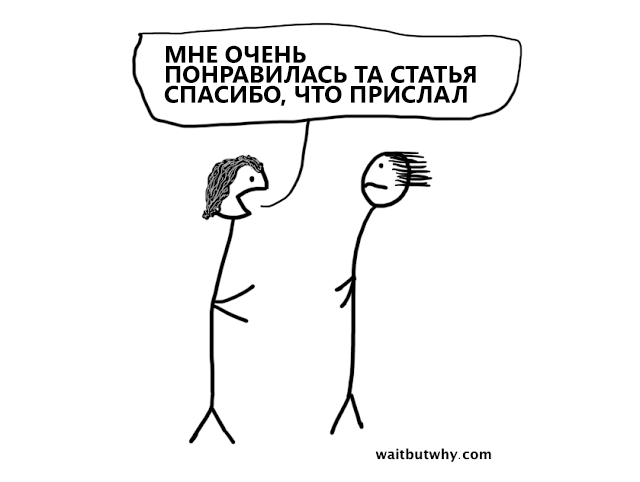
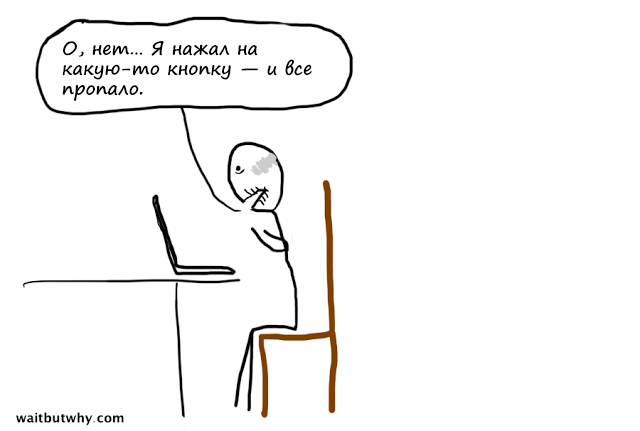
For my grandmother, who, with a randomly minimized browser window, says: “The device broke,” words like “forward”, “attachment”, “link” do not have simple and precise definitions. For her, these are complex vague concepts that she hears, but which she does not understand.
E-mail gives her the same feeling that this proposal gives me: “Central banks in developing countries are tightening policies and intervening in foreign exchange markets in response to concerns about the possible effect of currency depreciation on inflation, although gross issuance of non-financial corporate bonds and commercial paper has slowed down and interest rate fluctuations have declined significantly, which may also suggest another increase in income on securities, expressed as interest rates Avki . "
If, in principle, you are not too lazy to write a letter, then it is better to keep handwritten correspondence with people born in the 1920s. Especially since in 50 years it will be very cool to have at your disposal a paper answer from someone born in the 1920s.
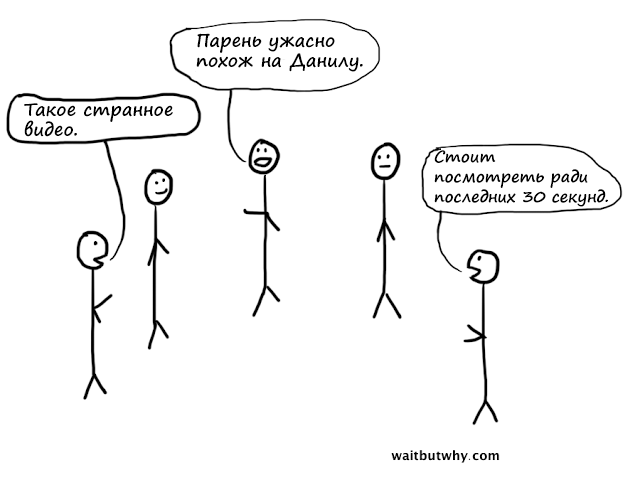


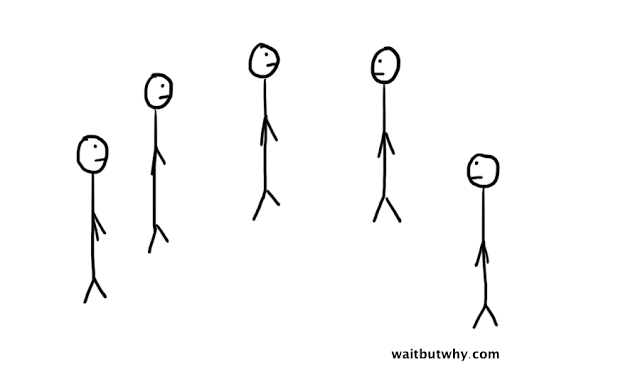
To make their lives easier, people to a certain extent agreed on certain rules and norms for addressing different categories of people in emails.
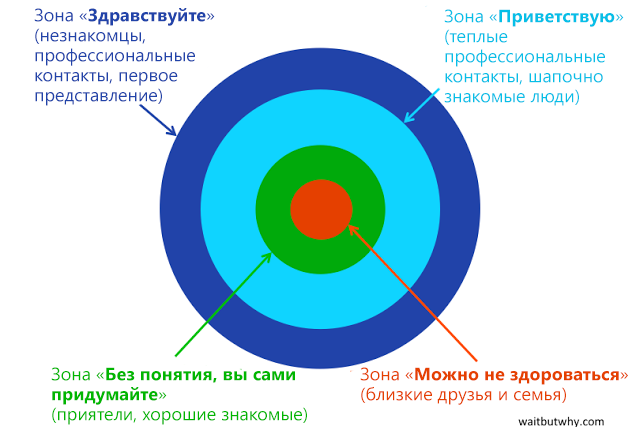
Notice the problem?
“Hello, _____” is a friendly message to everyone you don't know well enough; handling distance, neutrality and professional boundaries. When your relationship with someone moves a step further, you are in a warmer “Greetings” zone. But with the closest ones, the greeting can be omitted altogether (hardly anyone will start the letter with the words: “Greetings, mother”).
But what to do with people from this green zone - with those who are more than just acquaintances? The greeting “Greetings” would be too formal, but to write to them suddenly without any greetings - for this you do not communicate often enough. How the hell should start a letter to a fellow student with whom you communicate once every two years, or to a former colleague with whom you made friends while working together and after almost losing touch?
It is not easy. And, unlike all other greetings, it requires a creative approach. Here are a few options:
- Hi, Valera! - The exclamation mark means: “This is not a simple greeting: I smile and show emotions, because we know each other quite well and our relations make me happy.”
- Valerka! - A typical welcome response to "Hi Valera!". This answer confirms: you are close enough to use diminutive names. And the exclamation mark makes it clear that the respondent experiences the same positive emotions from friendship as the one who wrote first.
- Hello - So, in the green zone, the issue with greetings is not very well known to each other guys or close friends. This is the equivalent of a friendly pat on the back.
- Saaaash - So the girls solve the green zone problem.
- Hai - This option means: “I just decided to write something, because we are friends, so sometimes we chat a few words to each other.”
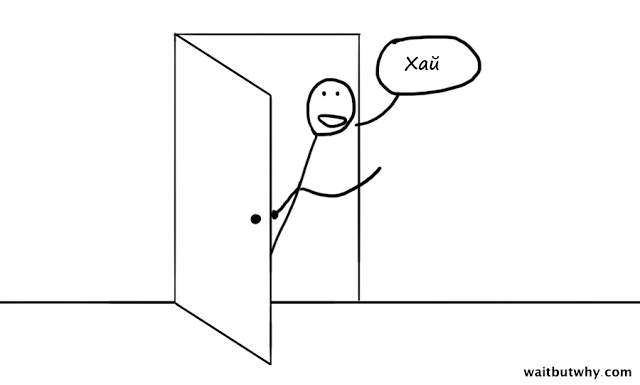
Similar situation. For the widest circle of people, we have a sea of templates (“Have a nice day,” “Regards”, “See you”, “Take care of yourself”, “Thank you”, etc.), and for formally close people, the formal farewell are needed. But buddies are a whole different story.
Sometimes I finish a letter for a friend with a word like "Thank you", I look at it and think: "No, this is too formal." I sigh, move the cursor to the middle of the word immediately after the letter “and” and reluctantly add two more “and”.
It is worth noting: some people think that at the end of the letter you can just write “hoho” (after all, they are such cuties), and others - that you can sign the first letter of the name (since we, apparently, are already dating). When I come across something like that, I imagine that these people looked like this when writing a letter:
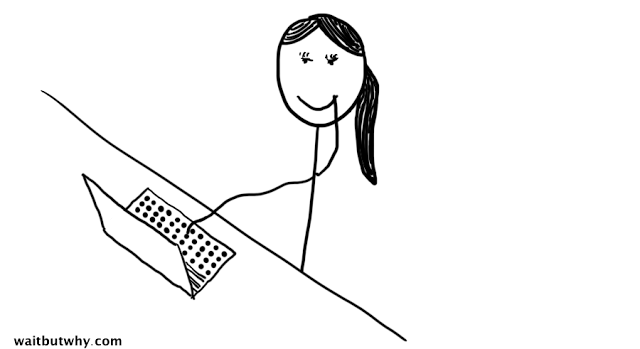
Phrases from the “conversation of robots” are so often found in correspondence that you insert them into your speech simply because they are used by everyone around you, and you are not such a creative person.
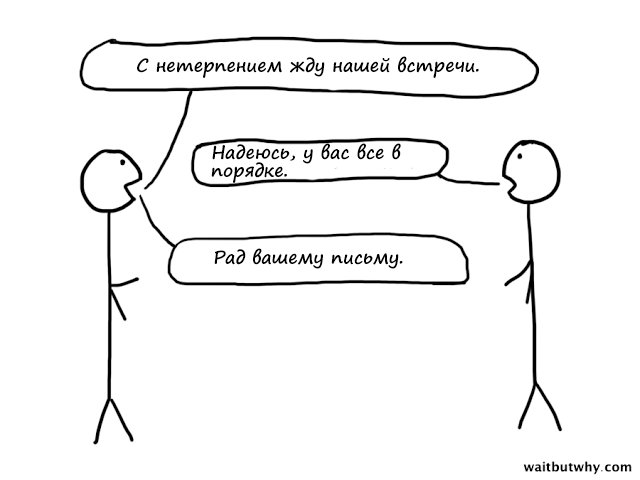
These phrases remind me of a recording on my answering machine: “Hi, you called Timothy. Please leave your message. ” Immediately after this, I recall the robot itself, which says: “Leave your message after the beep.” Here we - both I and the robot - equally express our “individuality”. But unfortunately, there is only one alternative to “talking robots”: to be a strange eccentric with unpredictable behavior.
Unlike template phrases on an answering machine, the society does not particularly oblige us to use the same phrases in electronic correspondence. But most of us are too lazy to invent something of our own instead. And each time, typing such a phrase, I feel a slight fit of self-hatred for this social conformism.
In face-to-face communication, we have a million sophisticated ways to express intonation. Opportunities for this voice is quite enough even by phone, when you can not see facial expressions and gestures.
But in electronic correspondence, we are limited to a primitive set of characters to denote all shades of meaning, and this makes punctuation crucial for communicating via e-mail. Here are a few rules:
Some people do not use exclamation marks; in dealing with them it is better to use points.
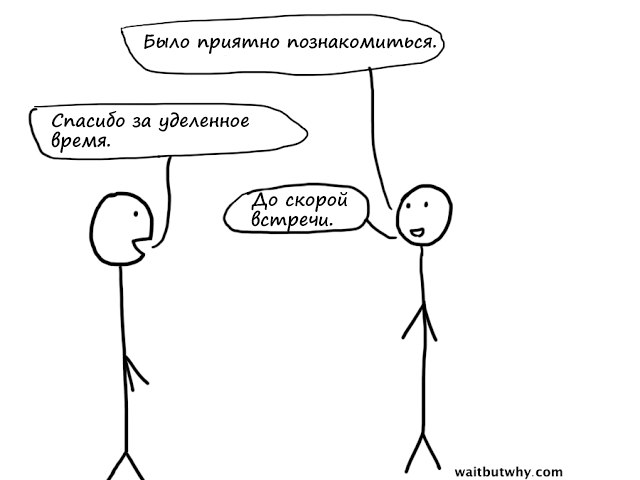
Others always use them, and you risk falling out of favor if you do not do the same. So have fun with them.
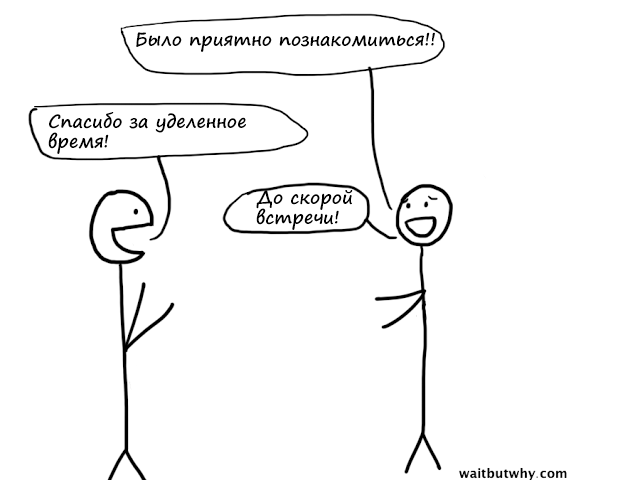
This is important because for an ardent supporter of exclamations, the difference between a dot and an exclamation mark looks like this:
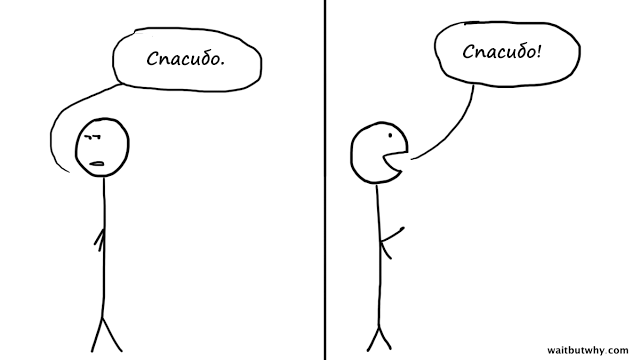
And sometimes there is a rare, but terrible typo: an exclamation mark instead of a question mark.

I can write with or without exclamation marks. Usually I just adapt to the interlocutor, but it seems to me that there is a rather strong correlation here:
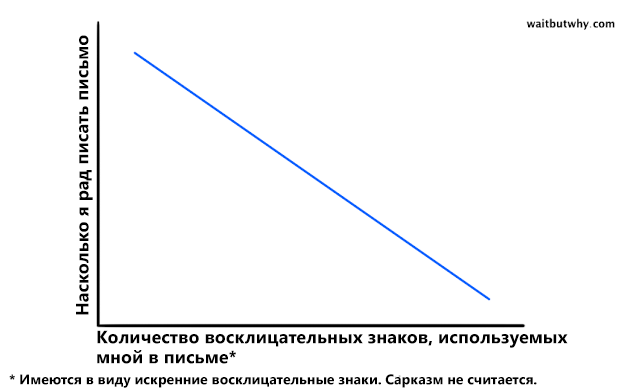
Dots are a different matter. Some use it to add mystery or threats ... And, of course, this sign can be extremely depraved.
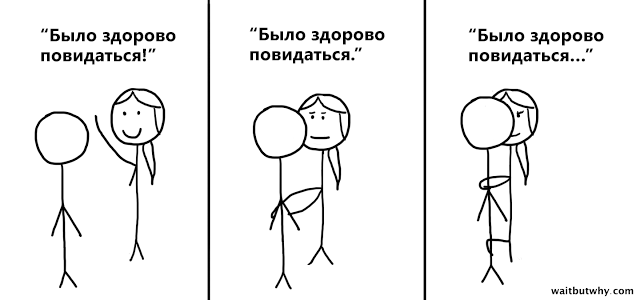
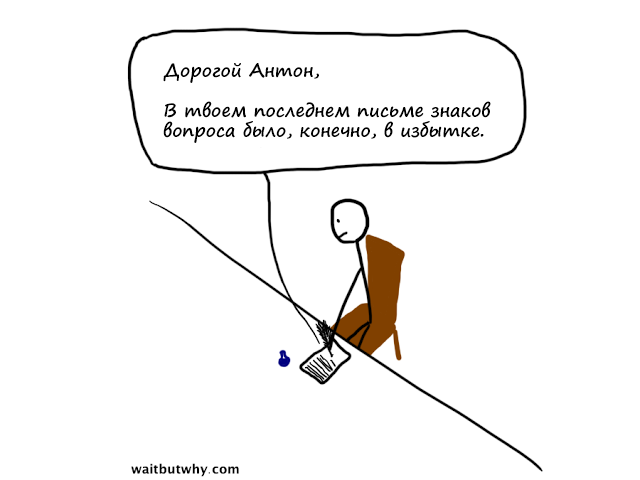
This is a very strange phenomenon, peculiar exclusively to communication by e-mail. This happens when two not so close friends are drawn into a mutually binding ritual of long descriptions of their own lives once every couple months. Both sides are sick of having to answer all the questions from the last letter and write another opus about themselves, and each of them is painfully boring to read about the life of the interlocutor.
This cycle continues either until the death of one of the penpals, or until one of them gains the courage not to respond to the letter - and then both of them can finally breathe a sigh of relief.
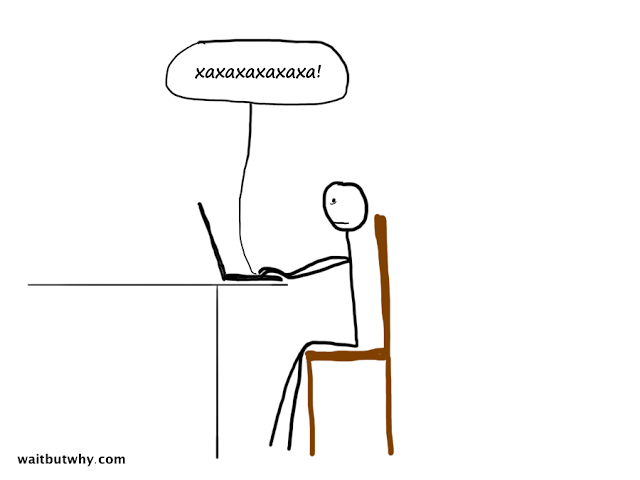
Laughter is a wonderful component of voice communication, so we tried to transfer it to electronic correspondence. But it didn't work out very well.
Except for strange people writing "lol", this is what we are dealing with:
haha - I find it either moderately funny, or not funny at all
hahaha - it's a little funny
hahahaha - this is really funny
HA or HAHA or HAHAHAHA - This is very funny
hahaha or hahahaha - i'm so original
At least in my world, if I find something really funny, I will use capital letters.
And in almost all of the cases mentioned, the one who reads represents the person who writes who actually laughs while writing the replica, although in reality this person most likely looks like the guy in the image above.
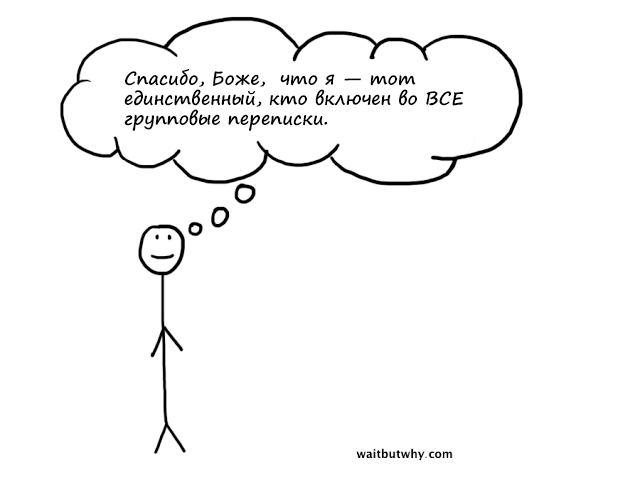
An insincere haha is just the beginning.
You know that people sometimes add someone to the “Bcc” field in order to connect this person to the correspondence secretly from other participants - but you know what you do not take into account? When you yourself receive from someone a letter with a hidden copy, about which you do not know, you are the very simpleton for whom you are spying. This is frustrating, right?
What about the fact that you participate in a variety of group correspondence, single and periodical, and somehow by default think that this is the only group correspondence. In fact, there is still a certain number of correspondence within the same groups - your friends or family members - in which you are not included and of which you do not even suspect the existence.
But it could be worse. Think of cases when you forwarded the received letter to someone else to make fun of the sender. It's mean, but you did it, right? And is it not disgusting to realize that at some point you yourself were the object of secret mockery?
Fortunately, we try not to think about such things happening. But they occur.


Disasters in electronic correspondence are a separate type of disasters. They can be suicidal, painful, or even serious damage to friendship. Here are some examples:
In general, other people's stories about such disasters are a great source of pleasure for the sufferings of others, so if you have them in stock, share in the comments.
About the translator
The article is translated in Alconost.
Alconost is engaged in the localization of applications, games and websites in 60 languages. Language translators, linguistic testing, cloud platform with API, continuous localization, 24/7 project managers, any formats of string resources.
We also make advertising and training videos - for websites selling, image, advertising, training, teasers, expliners, trailers for Google Play and the App Store.
Read more: https://alconost.com
The refusal of email today is comparable to the refusal of a phone number: you must really be on your own wave in order to venture on it.
And here we all write something in the windows of new messages, fight in mailboxes - everything seems to be going well. But, as with any social interaction, electronic correspondence has its pitfalls.
')
Let's discuss the 11 most awkward moments that electronic correspondence brings to our lives.
Translated by localization company Alconost

1) Exchange of replicas of unequal power
If someone with whom you correspond:
- admits typos, and you - no;
- ignores the rules of punctuation, and you - no;
- forgets about capital letters, and you - no;
- delays the response to the letters, but you don’t;
- Answers your detailed and well written letters shortly, -
he has full power over you.
The unequal distribution of power in emails can be explained by many factors: the difference in career position or age, the “customer is always right” circumstance, the correspondence of many people with one addressee. But usually it happens because the one who writes high-quality letters needs something from the one who writes it at random. That's how simple it is.
2) Correspondence with people from the Smoke on the Water era
I do not mean those who like this song. It is more about those whose youth came in the 70s and whose competencies do not include issues from the field of IT.
These are the last of the Mohicans, still using the AOL address. They scan a paper copy of the article and send it as an attachment to the letter instead of sending a link to the article. They write the word "e-mail" with a hyphen. And they don’t even suspect the existence of the option “Answer all”:





Sometimes you meet people who, for inexplicable reasons, write letters only in capital letters:

3) Correspondence with those born before 1930

For my grandmother, who, with a randomly minimized browser window, says: “The device broke,” words like “forward”, “attachment”, “link” do not have simple and precise definitions. For her, these are complex vague concepts that she hears, but which she does not understand.
E-mail gives her the same feeling that this proposal gives me: “Central banks in developing countries are tightening policies and intervening in foreign exchange markets in response to concerns about the possible effect of currency depreciation on inflation, although gross issuance of non-financial corporate bonds and commercial paper has slowed down and interest rate fluctuations have declined significantly, which may also suggest another increase in income on securities, expressed as interest rates Avki . "
If, in principle, you are not too lazy to write a letter, then it is better to keep handwritten correspondence with people born in the 1920s. Especially since in 50 years it will be very cool to have at your disposal a paper answer from someone born in the 1920s.
4) Late responses to group correspondence




5) Search for suitable greetings for non-close friends.
To make their lives easier, people to a certain extent agreed on certain rules and norms for addressing different categories of people in emails.

Notice the problem?
“Hello, _____” is a friendly message to everyone you don't know well enough; handling distance, neutrality and professional boundaries. When your relationship with someone moves a step further, you are in a warmer “Greetings” zone. But with the closest ones, the greeting can be omitted altogether (hardly anyone will start the letter with the words: “Greetings, mother”).
But what to do with people from this green zone - with those who are more than just acquaintances? The greeting “Greetings” would be too formal, but to write to them suddenly without any greetings - for this you do not communicate often enough. How the hell should start a letter to a fellow student with whom you communicate once every two years, or to a former colleague with whom you made friends while working together and after almost losing touch?
It is not easy. And, unlike all other greetings, it requires a creative approach. Here are a few options:
- Hi, Valera! - The exclamation mark means: “This is not a simple greeting: I smile and show emotions, because we know each other quite well and our relations make me happy.”
- Valerka! - A typical welcome response to "Hi Valera!". This answer confirms: you are close enough to use diminutive names. And the exclamation mark makes it clear that the respondent experiences the same positive emotions from friendship as the one who wrote first.
- Hello - So, in the green zone, the issue with greetings is not very well known to each other guys or close friends. This is the equivalent of a friendly pat on the back.
- Saaaash - So the girls solve the green zone problem.
- Hai - This option means: “I just decided to write something, because we are friends, so sometimes we chat a few words to each other.”

5B) The choice of the ending letter addressed to a friend
Similar situation. For the widest circle of people, we have a sea of templates (“Have a nice day,” “Regards”, “See you”, “Take care of yourself”, “Thank you”, etc.), and for formally close people, the formal farewell are needed. But buddies are a whole different story.
Sometimes I finish a letter for a friend with a word like "Thank you", I look at it and think: "No, this is too formal." I sigh, move the cursor to the middle of the word immediately after the letter “and” and reluctantly add two more “and”.
It is worth noting: some people think that at the end of the letter you can just write “hoho” (after all, they are such cuties), and others - that you can sign the first letter of the name (since we, apparently, are already dating). When I come across something like that, I imagine that these people looked like this when writing a letter:

6) "Talking robots", because in fact you are not so unique
Phrases from the “conversation of robots” are so often found in correspondence that you insert them into your speech simply because they are used by everyone around you, and you are not such a creative person.

These phrases remind me of a recording on my answering machine: “Hi, you called Timothy. Please leave your message. ” Immediately after this, I recall the robot itself, which says: “Leave your message after the beep.” Here we - both I and the robot - equally express our “individuality”. But unfortunately, there is only one alternative to “talking robots”: to be a strange eccentric with unpredictable behavior.
Unlike template phrases on an answering machine, the society does not particularly oblige us to use the same phrases in electronic correspondence. But most of us are too lazy to invent something of our own instead. And each time, typing such a phrase, I feel a slight fit of self-hatred for this social conformism.
7) Party to punctuation chess
In face-to-face communication, we have a million sophisticated ways to express intonation. Opportunities for this voice is quite enough even by phone, when you can not see facial expressions and gestures.
But in electronic correspondence, we are limited to a primitive set of characters to denote all shades of meaning, and this makes punctuation crucial for communicating via e-mail. Here are a few rules:
Some people do not use exclamation marks; in dealing with them it is better to use points.

Others always use them, and you risk falling out of favor if you do not do the same. So have fun with them.

This is important because for an ardent supporter of exclamations, the difference between a dot and an exclamation mark looks like this:

And sometimes there is a rare, but terrible typo: an exclamation mark instead of a question mark.

I can write with or without exclamation marks. Usually I just adapt to the interlocutor, but it seems to me that there is a rather strong correlation here:

Dots are a different matter. Some use it to add mystery or threats ... And, of course, this sign can be extremely depraved.

8) Epic correspondence, which is not needed by any of the participants

This is a very strange phenomenon, peculiar exclusively to communication by e-mail. This happens when two not so close friends are drawn into a mutually binding ritual of long descriptions of their own lives once every couple months. Both sides are sick of having to answer all the questions from the last letter and write another opus about themselves, and each of them is painfully boring to read about the life of the interlocutor.
This cycle continues either until the death of one of the penpals, or until one of them gains the courage not to respond to the letter - and then both of them can finally breathe a sigh of relief.
9) Transferring the concept of laughter to e-mail

Laughter is a wonderful component of voice communication, so we tried to transfer it to electronic correspondence. But it didn't work out very well.
Except for strange people writing "lol", this is what we are dealing with:
haha - I find it either moderately funny, or not funny at all
hahaha - it's a little funny
hahahaha - this is really funny
HA or HAHA or HAHAHAHA - This is very funny
hahaha or hahahaha - i'm so original
At least in my world, if I find something really funny, I will use capital letters.
And in almost all of the cases mentioned, the one who reads represents the person who writes who actually laughs while writing the replica, although in reality this person most likely looks like the guy in the image above.
10) Things that hurt you happen, but you try not to think about them.

An insincere haha is just the beginning.
You know that people sometimes add someone to the “Bcc” field in order to connect this person to the correspondence secretly from other participants - but you know what you do not take into account? When you yourself receive from someone a letter with a hidden copy, about which you do not know, you are the very simpleton for whom you are spying. This is frustrating, right?
What about the fact that you participate in a variety of group correspondence, single and periodical, and somehow by default think that this is the only group correspondence. In fact, there is still a certain number of correspondence within the same groups - your friends or family members - in which you are not included and of which you do not even suspect the existence.
But it could be worse. Think of cases when you forwarded the received letter to someone else to make fun of the sender. It's mean, but you did it, right? And is it not disgusting to realize that at some point you yourself were the object of secret mockery?
Fortunately, we try not to think about such things happening. But they occur.
11) Disaster email correspondence


Disasters in electronic correspondence are a separate type of disasters. They can be suicidal, painful, or even serious damage to friendship. Here are some examples:
- You write to person X to report something bad about person Y, and accidentally send this letter to person Y instead of person X.
- You want to reply only to person X in group correspondence to communicate something personal, and randomly send this answer to the whole group.
- You send the letter to someone and forget that all correspondence is available under it, where there may be confidential information, perhaps even concerning the person to whom the letter is being sent.
- You send the attachment to someone and accidentally attach to the letter a completely different and at the same time necessarily awful thing.
In general, other people's stories about such disasters are a great source of pleasure for the sufferings of others, so if you have them in stock, share in the comments.
About the translator
The article is translated in Alconost.
Alconost is engaged in the localization of applications, games and websites in 60 languages. Language translators, linguistic testing, cloud platform with API, continuous localization, 24/7 project managers, any formats of string resources.
We also make advertising and training videos - for websites selling, image, advertising, training, teasers, expliners, trailers for Google Play and the App Store.
Read more: https://alconost.com
Source: https://habr.com/ru/post/225993/
All Articles